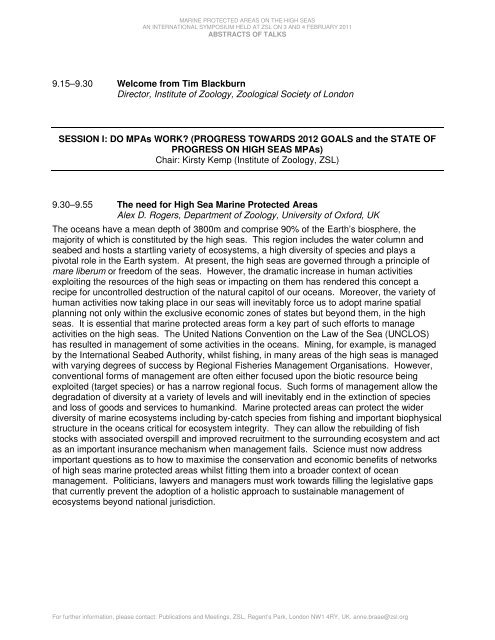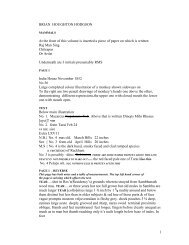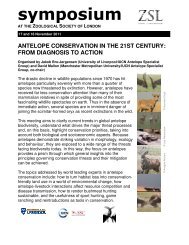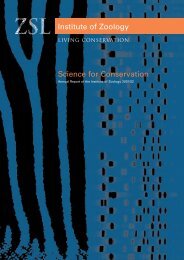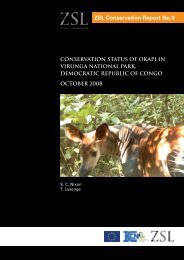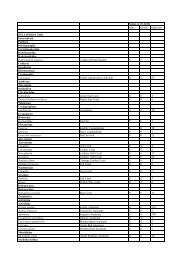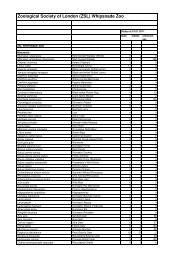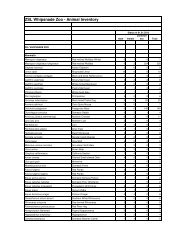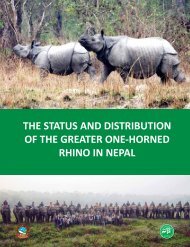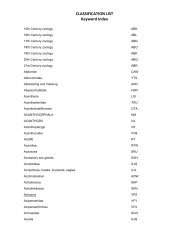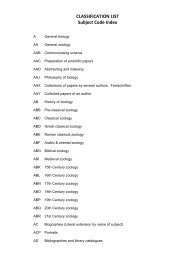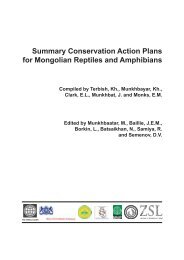MPA Symposium - Zoological Society of London
MPA Symposium - Zoological Society of London
MPA Symposium - Zoological Society of London
Create successful ePaper yourself
Turn your PDF publications into a flip-book with our unique Google optimized e-Paper software.
MARINE PROTECTED AREAS ON THE HIGH SEAS<br />
AN INTERNATIONAL SYMPOSIUM HELD AT ZSL ON 3 AND 4 FEBRUARY 2011<br />
ABSTRACTS OF TALKS<br />
9.15–9.30 Welcome from Tim Blackburn<br />
Director, Institute <strong>of</strong> Zoology, <strong>Zoological</strong> <strong>Society</strong> <strong>of</strong> <strong>London</strong><br />
SESSION I: DO <strong>MPA</strong>s WORK? (PROGRESS TOWARDS 2012 GOALS and the STATE OF<br />
PROGRESS ON HIGH SEAS <strong>MPA</strong>s)<br />
Chair: Kirsty Kemp (Institute <strong>of</strong> Zoology, ZSL)<br />
9.30–9.55 The need for High Sea Marine Protected Areas<br />
Alex D. Rogers, Department <strong>of</strong> Zoology, University <strong>of</strong> Oxford, UK<br />
The oceans have a mean depth <strong>of</strong> 3800m and comprise 90% <strong>of</strong> the Earth’s biosphere, the<br />
majority <strong>of</strong> which is constituted by the high seas. This region includes the water column and<br />
seabed and hosts a startling variety <strong>of</strong> ecosystems, a high diversity <strong>of</strong> species and plays a<br />
pivotal role in the Earth system. At present, the high seas are governed through a principle <strong>of</strong><br />
mare liberum or freedom <strong>of</strong> the seas. However, the dramatic increase in human activities<br />
exploiting the resources <strong>of</strong> the high seas or impacting on them has rendered this concept a<br />
recipe for uncontrolled destruction <strong>of</strong> the natural capitol <strong>of</strong> our oceans. Moreover, the variety <strong>of</strong><br />
human activities now taking place in our seas will inevitably force us to adopt marine spatial<br />
planning not only within the exclusive economic zones <strong>of</strong> states but beyond them, in the high<br />
seas. It is essential that marine protected areas form a key part <strong>of</strong> such efforts to manage<br />
activities on the high seas. The United Nations Convention on the Law <strong>of</strong> the Sea (UNCLOS)<br />
has resulted in management <strong>of</strong> some activities in the oceans. Mining, for example, is managed<br />
by the International Seabed Authority, whilst fishing, in many areas <strong>of</strong> the high seas is managed<br />
with varying degrees <strong>of</strong> success by Regional Fisheries Management Organisations. However,<br />
conventional forms <strong>of</strong> management are <strong>of</strong>ten either focused upon the biotic resource being<br />
exploited (target species) or has a narrow regional focus. Such forms <strong>of</strong> management allow the<br />
degradation <strong>of</strong> diversity at a variety <strong>of</strong> levels and will inevitably end in the extinction <strong>of</strong> species<br />
and loss <strong>of</strong> goods and services to humankind. Marine protected areas can protect the wider<br />
diversity <strong>of</strong> marine ecosystems including by-catch species from fishing and important biophysical<br />
structure in the oceans critical for ecosystem integrity. They can allow the rebuilding <strong>of</strong> fish<br />
stocks with associated overspill and improved recruitment to the surrounding ecosystem and act<br />
as an important insurance mechanism when management fails. Science must now address<br />
important questions as to how to maximise the conservation and economic benefits <strong>of</strong> networks<br />
<strong>of</strong> high seas marine protected areas whilst fitting them into a broader context <strong>of</strong> ocean<br />
management. Politicians, lawyers and managers must work towards filling the legislative gaps<br />
that currently prevent the adoption <strong>of</strong> a holistic approach to sustainable management <strong>of</strong><br />
ecosystems beyond national jurisdiction.<br />
For further information, please contact: Publications and Meetings, ZSL, Regent’s Park, <strong>London</strong> NW1 4RY, UK. anne.braae@zsl.org


